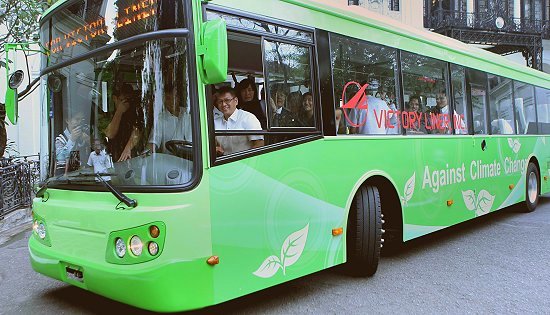ES Ochoa leads launch
of battery-powered commuter bus
|

Executive
Secretary N. Paquito Ochoa Jr. leads the launching of
battery-powered commuter bus called eBus at the Kalayaan
Grounds, Malacañang on March 16, 2012. The Climate Change
Commission partnered with Victory Liner to produce the new breed
of commuter bus under the program “Victory Against Climate
Change”. (ROBERT VINAS / Malacañang Photo Bureau) |
Press Release
March
16, 2012
MANILA – Executive
Secretary Paquito N. Ochoa, Jr. turned on the ignition of a new breed
of commuter bus that was designed to run on batteries thus, produces
no greenhouse gas (GHG) and is a boon in the government’s efforts to
stop climate change.
The introduction of
the battery-powered bus, called eBus, was made possible through the
program dubbed ‘Victory Against Climate Change’, a partnership between
the Climate Change Commission and Victory Liner, one of the leading
transportation operators in the country. President Benigno Aquino III
is the Commission’s Chairperson.
Under Republic Act
9729, also known as the Climate Change Act of 2009, the Commission is
mandated to promote and provide technical support to local research
and development programs that will help address climate change.
“We are looking at the
eBus as one of the vehicles that will carry government efforts to
address the causes of climate change. The use of gasoline or diesel
in our vehicles has been identified by science as one of the causes of
climate change as it produces carbon dioxide, one of the major GHG in
our atmosphere,” Ochoa explained.
Sec. Mary Ann Lucille
L. Sering, Commission Vice-Chair, said that the use of battery-powered
vehicles is one of the strategies under the National Climate Change
Action Plan (NCCAP) to help reduce the emission of greenhouse gases.
She also said that the greenhouse gas inventory of the Philippines
revealed that the transportation sector is the highest emitter of
greenhouse gases.
“You need not be an
expert to recognize the problem of pollution in the cities,
particularly in Metro Manila. Just look at our streets and you will
see commuter vehicles belching black smoke. That is not only bad for
our climate but also for our health,” she said.
Sering said that there
is a need to engage the private sector more in the effort to fight
against climate change and expressed hope that other transportation
companies will adopt the new technology.
The bus runs on
400V “Winston” rare-earth Yttrium Lithium-ion battery with a maximum
speed of 90 kph. The bus has 26 seats but can carry a total of 52
passengers.